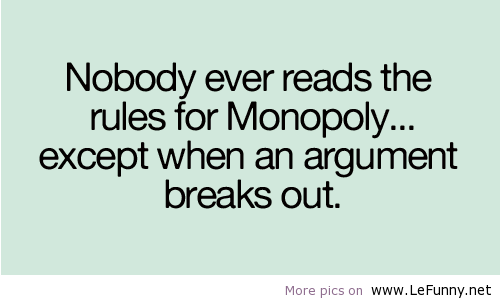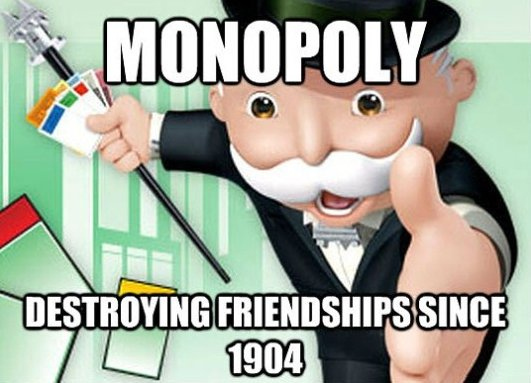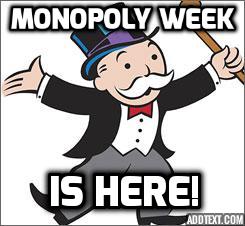
As I said in my recent blog post In Defense of Monopoly, one of the major advantages to the game Monopoly is its malleability. There are a number of “house rules” that are used as if they are a part of the game, while other rules are ignored completely. Sometimes it seems like everywhere you look, a different set of rules is being used when playing this classic game. A lot of the rules that are added (or scrapped) add to the fun of the game, but there are also rules that can directly result in the game being drawn-out and less enjoyable overall. After having some experience playing numerous different types of Monopoly boards and implementing all sorts of different rules, I have come up with some observations on the best way to ensure your Monopoly game is played with rules that will enhance the game rather than drag it down. I’ve split the types of rules up into three sections: official rules, house rules, and new rule suggestions.
Official Rules
1) Auctioning Property- The official rules in the Monopoly rulebook state that, “Whenever you land on an unowned property you may buy that property from the Bank at its printed price… If you do not wish to buy the property, the Bank sells it at auction to the highest bidder. The high bidder pays the Bank the amount of the bid in cash and receives the Title Deed card for that property. Any player, including the one who declined the option to buy it at the printed price, may bid. Bidding may start at any time.” I can’t tell you how often this rule gets overlooked or ignored when I’m playing with friends, but truth be told this is an extremely important rule to utilize if you want your game to start off fast. Auctions aren’t necessary to play the game, but they do drive it forward at a faster pace and they also require a significant amount of strategy. Auctions are a good way to keep the game fair too- someone could have few properties but a large amount of money, and the ability to auction will help them get back in the game. Ultimately the start of a game of Monopoly without auctioning is fairly dull and can allow a player to pull ahead early, so the ability to auction helps balance the scales and keep things moving.
2) Mortgages- Mortgaging a property can seem like a pain, but it is a good way to ensure that you are not eliminated from a game. One of the paramount strategies of Monopoly is to keep your monopolies intact to increase your odds of a big payout. But if you land on someone’s property and have to pay up, it’s difficult to keep your houses/hotels on the board in order to do some real damage. The ability to mortgage should be used when possible, but should also not be taken lightly. I’ve seen people disregard the 10% interest rule when mortgaging; ultimately that seems like a good way to keep players who got hit hard in the game, but it also gives people an opportunity to mortgage cards early for short term gains without penalties when they want to un-mortgage the property. This is one of those rules you should keep intact.
3) Buying and selling houses/hotels- As I’ve said before, building on monopolies is a big part of success in a game. However, there should also be a cost if you try to expand too quickly and it backfires. The official rules state that if you have to sell back a house or hotel, you only get half of the money you originally paid for it. This rule is extremely important to ensure that players do not spend all of their money on hotels at once- a gradual pace for hotel building is a good way to keep things more evenly matched. Selling houses and hotels should be considered a last resort, and being able to get your full money back diminishes the risks of investing in your monopolies.
House Rules
1) Free Parking Money- This is the most wildly-contested rule out there; is there supposed to be money in free parking? If so, how much? Do you add money from income taxes to the free parking “pot”? Ultimately this i s not an official rule to Monopoly, but it’s an extremely popular one and is used in a variety of different ways. I personally believe that this is a good rule because it has the ability to provide alittle extra respite to players down on their luck. The ideal scenario in my opinion is to add $500 to the free parking pot at the beginning of the game, and then once somebody
s not an official rule to Monopoly, but it’s an extremely popular one and is used in a variety of different ways. I personally believe that this is a good rule because it has the ability to provide alittle extra respite to players down on their luck. The ideal scenario in my opinion is to add $500 to the free parking pot at the beginning of the game, and then once somebody
lands on it, you refill it by that same amount. No income tax or Chance/Community chest money should go into the pot, so that it acts solely as some additional funds rather than a complete game changer.
2) Landing on Go- This rule revolves around the idea of “Passing” go and collecting $200. This is what the board and the rules say, but what happens if you land on Go? Officially, nothing would happen, because your piece has to pass the space before you receive the money. However, there is a house rule some people use to provide an extra reward for landing on Go. In this scenario, you actually receive $400 if you land on go as opposed to pass it. I have no issue with this rule, but I do recommend setting it up with a slight addendum; when you land on Go you receive $200, then get the extra $200 on the next turn after you’ve passed the space. That way a player isn’t automatically flush with $400 cash in one turn, but still gets the extra award for landing on Go.
3) Trading properties- Trading properties is an essential part of Monopoly. The ability to trade for monopolies is an important way to ensure that you can advance the game, but it is not officially stated in the original rules that trades are allowed. While trading is necessary to create a more fun game, it also has the ability to cause skewed games from lopsided trades. Because of this, I have a slight alteration on the standard trading process that I recommend. Rather than trading at any point in the game, a player can only propose trades on their turn. Trades are completed before any dice are rolled, and if the trade created a Monopoly that player can’t add houses or hotels to the new monopoly until his/her next turn. Finally, if there are more than 4 players playing the game and at least 3 people consider the trade to be unfair, they can reject it (this is not something I’ve ever practiced myself, but I think it would be more likely to ensure a single player doesn’t run away with the game).
New Rule Suggestions
1) Jail- I can’t even describe how infuriating it is to watch someone get carted off to jail (metaphorically of course) right before landing in my monopoly area, and then have myself land on their property and lose everything while they sit pretty for 3 turns. Because of this, I recommend a rule variant that isn’t used by many but should be a positive change to the game. If a player is put into jail, they are then officially unable to collect payment from a player landing on their properties, and also cannot buy ho uses or hotels until they are released. The player can buy out of jail at any time in the 3 turn stint, but ultimately if the player stays in jail no players landing on his/her properties will have to pay the fees associated. This will cause players to want to leave jail earlier, which will speed up the game and make sure that each player has greater chances of landing on an opponent’s space.
uses or hotels until they are released. The player can buy out of jail at any time in the 3 turn stint, but ultimately if the player stays in jail no players landing on his/her properties will have to pay the fees associated. This will cause players to want to leave jail earlier, which will speed up the game and make sure that each player has greater chances of landing on an opponent’s space.
2) Starting Game, Property Buying Delay- This is a rule I’ve played with my friends in the past to varying success. The concept is that you have to pass all the way around the board once before you are allowed to buy any properties. The rule is supposed to promote fairness since generally speaking the player who goes first in traditional Monopoly has a higher chance of winning properties. However, if a player lands in jail or rolls poorly during the first few turns, he/she becomes crippled by the rule and it makes it that much harder to get back into it. Ultimately there are pros and cons to this rule, so there’s no harm in trying it yourself but I would not recommend it as a must-rule to improve the game.
Ultimately these rules are about creating the best experience you can when playing Monopoly. This means that if you don’t like one of the rules, you shouldn’t use it, and instead use whatever rules you find to be the most fun. There are also rule variants out there for intentionally shortened games, so if time is the major concern there are options for fixing that. If you have any other cool ideas (I know that Past Go’s writer Geoffrey Greer was looking into a variant that could break apart an opponent’s monopolies mid-game) then send me a comment about it!

 are a huge number of possibilities and directions you can take when playing a card. At first when I read my cards I assumed there was no way I would be able to use some of them, but sure enough a round came along where they were the perfect fit. In addition, the fact that the judge gets to play one of the cards is a huge positive in comparison to CAH and Apples to Apples. The judge actually gets to shape the story the way they see fit, which can very quickly add to the hilarity.
are a huge number of possibilities and directions you can take when playing a card. At first when I read my cards I assumed there was no way I would be able to use some of them, but sure enough a round came along where they were the perfect fit. In addition, the fact that the judge gets to play one of the cards is a huge positive in comparison to CAH and Apples to Apples. The judge actually gets to shape the story the way they see fit, which can very quickly add to the hilarity.



 or the first time and feeling like everybody knows what to do, and even better it doesn’t feel like the same game you’ve always played because of the new cards and style. I also appreciate that the game is a bit more highbrow in its profanity- in no way does the game avoid dirty jokes, but it does find a way to make them more intellectual. Finally, the game is a great for social events and can be played with any number of players.
or the first time and feeling like everybody knows what to do, and even better it doesn’t feel like the same game you’ve always played because of the new cards and style. I also appreciate that the game is a bit more highbrow in its profanity- in no way does the game avoid dirty jokes, but it does find a way to make them more intellectual. Finally, the game is a great for social events and can be played with any number of players.























 ge publishing company may not seem like the most effective way to get to where you want to go, but taking the game to the masses and hoping the concept draws enough support is certainly becoming more common. There have been over 9,000 board games that were created and published through a Kickstarter campaign, including significantly popular games such as
ge publishing company may not seem like the most effective way to get to where you want to go, but taking the game to the masses and hoping the concept draws enough support is certainly becoming more common. There have been over 9,000 board games that were created and published through a Kickstarter campaign, including significantly popular games such as 








 Cooperative board/card games have been becoming more popular over the past few years, with games such as Pandemic becoming more common for mass consumption. Cooperative games can have varying types and nuances to how they’re played, but the major theme is that rather than playing against each other, you play together against the game as a common enemy. Usually this involves completing some type of objective in order to win, while not meeting the objective will cause you to lose. Hanabi is a cooperative card game that actually goes by a different objective- work together to earn as many points as possible, with a point scale giving your group a grade at the end of the game. There aren’t any official winners or losers, but the competitive nature of the game is still tough to beat as you attempt to get a perfect score.
Cooperative board/card games have been becoming more popular over the past few years, with games such as Pandemic becoming more common for mass consumption. Cooperative games can have varying types and nuances to how they’re played, but the major theme is that rather than playing against each other, you play together against the game as a common enemy. Usually this involves completing some type of objective in order to win, while not meeting the objective will cause you to lose. Hanabi is a cooperative card game that actually goes by a different objective- work together to earn as many points as possible, with a point scale giving your group a grade at the end of the game. There aren’t any official winners or losers, but the competitive nature of the game is still tough to beat as you attempt to get a perfect score. olors of fireworks, all with numbered cards of 1-5, and the objective is to play all five of each color before the time runs out. The big catch in this game is that instead of players looking at their own cards, they face the cards outwards so that all players can see the cards except for the person holding them. Rather than simply telling a player which card to play, the other players have to provide hints about how many of a certain color or number is in the player’s hand. A player can also choose to play one of the cards in his/her hand; if they chose a card that chronologically matches what’s already been played, the card is added to the stack of the card’s color. Otherwise, the card is discarded. You also have a certain number of clues that you can give, which can be increased by a player intentionally discarding a card. The game ends when there are no more cards to use, and then points are tallied based on what cards were played by the end of the game.
olors of fireworks, all with numbered cards of 1-5, and the objective is to play all five of each color before the time runs out. The big catch in this game is that instead of players looking at their own cards, they face the cards outwards so that all players can see the cards except for the person holding them. Rather than simply telling a player which card to play, the other players have to provide hints about how many of a certain color or number is in the player’s hand. A player can also choose to play one of the cards in his/her hand; if they chose a card that chronologically matches what’s already been played, the card is added to the stack of the card’s color. Otherwise, the card is discarded. You also have a certain number of clues that you can give, which can be increased by a player intentionally discarding a card. The game ends when there are no more cards to use, and then points are tallied based on what cards were played by the end of the game. ct a player’s choice to play or discard cards. Memorization is also a key factor in the game, because you need to remember where each card is based on the clues you are given. The game is a lot of fun right off the bat as you are gathering information about your hand, and as more cards are played it is more difficult to play the cards in the correct order. There are also fewer of the higher value cards in the deck, so if you accidentally discard a 5 you can’t get a perfect score because there is only 5 card for each color available. All of this combines strategy combines into a game of subtle hints, careful decision making, and surprising amounts of tension whenever a card is played.
ct a player’s choice to play or discard cards. Memorization is also a key factor in the game, because you need to remember where each card is based on the clues you are given. The game is a lot of fun right off the bat as you are gathering information about your hand, and as more cards are played it is more difficult to play the cards in the correct order. There are also fewer of the higher value cards in the deck, so if you accidentally discard a 5 you can’t get a perfect score because there is only 5 card for each color available. All of this combines strategy combines into a game of subtle hints, careful decision making, and surprising amounts of tension whenever a card is played.

 s not an official rule to Monopoly, but it’s an extremely popular one and is used in a variety of different ways. I personally believe that this is a good rule because it has the ability to provide alittle extra respite to players down on their luck. The ideal scenario in my opinion is to add $500 to the free parking pot at the beginning of the game, and then once somebody
s not an official rule to Monopoly, but it’s an extremely popular one and is used in a variety of different ways. I personally believe that this is a good rule because it has the ability to provide alittle extra respite to players down on their luck. The ideal scenario in my opinion is to add $500 to the free parking pot at the beginning of the game, and then once somebody

 uses or hotels until they are released. The player can buy out of jail at any time in the 3 turn stint, but ultimately if the player stays in jail no players landing on his/her properties will have to pay the fees associated. This will cause players to want to leave jail earlier, which will speed up the game and make sure that each player has greater chances of landing on an opponent’s space.
uses or hotels until they are released. The player can buy out of jail at any time in the 3 turn stint, but ultimately if the player stays in jail no players landing on his/her properties will have to pay the fees associated. This will cause players to want to leave jail earlier, which will speed up the game and make sure that each player has greater chances of landing on an opponent’s space.

 understanding basic math and business, and figuring out when and when not to invest are just a few of the business skills you learn from playing Monopoly. Obviously in no way does Monopoly dir
understanding basic math and business, and figuring out when and when not to invest are just a few of the business skills you learn from playing Monopoly. Obviously in no way does Monopoly dir